In my most recent lecture of Sustainable Marketing I learned about the potential of partnerships and the impact they can have on creating a sustainable industry. It makes intuitive sense – different brands, manufacturers, NGO’s, industry associations, and government should work together instead of against each other in our fight against pollution. An example given was the partnership between the Ontario Power Authority (government) and Air Miles Rewards which gave birth to the Power Pledge Program. An even more substantial example is the Sustainable Apparel Coalition, which boasts a member’s list that includes Nike, Burberry, IKEA among other household names. To reduce the environmental and social impacts of the global apparel industry, the Sustainable Apparel Coalition has developed the Higg Index to aid clothing companies in becoming more sustainable.
Now you might be asking how ethanol fits into this discussion. Well, years ago agriculture groups in the United States and Canada lobbied government to pass laws requiring gasoline to be blended with up to 10% ethanol to ‘reduce carbon emissions’. The government of both countries passed these laws and to this day all of the gasoline we fuel our cars with contains a minimum of 5% ethanol. While not exactly a partnership, these groups did work together in order to implement this regulation in the name of ‘sustainability’ and were lauded by the public at the time.

A typical gasoline pump.
As it turns out, not all partnerships do what they claim to accomplish. Ethanol is not the solution to the global warming crisis we had hoped for. While ethanol does reduce emissions directly from vehicle combustion, the overall energy input required to grow and transform corn into ethanol is substantial. So substantial in fact, that ethanol actually has a negative net energy rating in some studies – meaning it requires more energy to make ethanol than burning ethanol gives back! Furthermore, ethanol blended gasoline deteriorates car parts which leads to costly repairs more often. For a more comprehensive reading on why ethanol is actually worse for our environment than straight gasoline, check out End the Ethanol Ripoff and The Great Ethanol Scam.
So if ethanol doesn’t benefit the environment, why did the agriculture groups and government agree to mandate ethanol use? I won’t say for certain but receiving approval from an industry as large as the agricultural industry certainly helps during elections:

Money and Politics, a match made in heaven.

People often say that good policy is not good politics and that is reflected here. It is interesting that the two of the largest contributors to GHG emissions, agriculture and transportation are working together here but are providing a negative outcome. This makes it clear that one must look at the full life cycle analysis to see whether the net result is better in the long run. This also somewhat reflects greenwashing, in that these regulations are on the surface “better for the environment” but in reality are not really doing much. Since 70-80% of emissions from the oil sands come from tank-to-wheel, the only solution is to drive less, or to switch to electric/hybrid cars. However since hybrid cars are so new, we do not know the full life cycle implications of their disposal.
Thanks for the reply Kristen! I definitely agree that we need to conduct full LCA’s before claiming whether one option is greater than any other. Unfortunately, to perform a proper LCA requires a lot of time and expertise, which the government may be lacking in at times. And even then, government may not follow the advice of an LCA because of competing incentives! If only we could trust politicians to act in the best interests of the population they represented. One can dream, right?